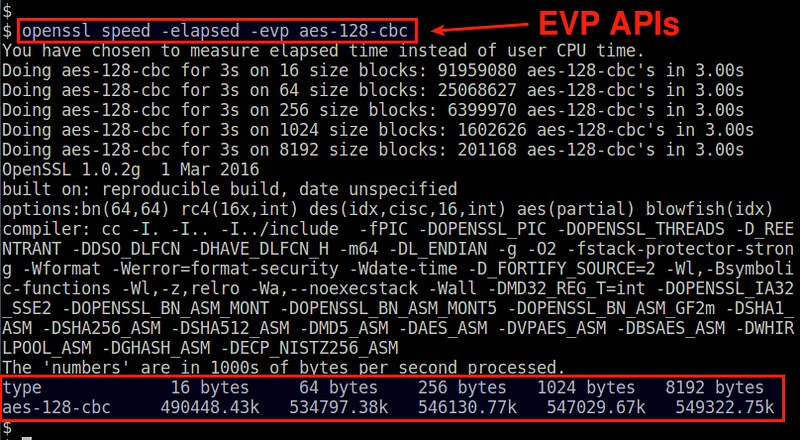OpenSSL 에서 AES-NI를 사용하고 있는 지의 확인을 성능으로 확인하는 방법
(펌) http://ask.xmodulo.com/check-aes-ni-enabled-openssl.html
How to check if AES-NI is enabled for OpenSSL on Linux
Intel Advanced Encryption Standard New Instructions (AES-NI) is a special instruction set for x86 processors, which is designed to accelerate the execution of AES algorithms. AES-based symmetric encryption is widely used in a variety of security applications and protocol implementations (e.g., IPSec, SSL/TLS, HTTPS, SSH). OpenSSL crypto library supports AES-based ciphers as well.
To support available hardware extensions, OpenSSL provides so-called EVP crypto APIs (e.g., EVP_Decrypt/EVP_Encrypt) which can automatically leverage hardware acceleration like AES-NI (if available) and fall back to software implementation (if not available), via a single interface. If you want to check whether currently installed OpenSSL supports AES-NI hardware acceleration, you can test using OpenSSL's EVP APIs.
Check if AES-NI is Available on CPU Processors
Before proceeding, first verify that current CPUs have the AES instruction set. For this you can inspect CPU flags as follows.
aes
If the output shows aes, that means AES-NI engine is available on current CPUs.
Check if AES-NI is Enabled for OpenSSL
To check whether OpenSSL can leverage AES instruction sets, you can use OpenSSL's EVP APIs. When EVP APIs are called, they can automatically detect the presence of AES-NI and accelerate AES encryption computations using AES instruction sets. Thus you can compare AES performance with or without EVP functions. If AES-NI is available for OpenSSL, you will see significant performance boost when EVP functions are used.
Let's use OpenSSL's built-in speed test.
To measure AES algorithm speed without AES-NI acceleration:
To measure AES algorithm speed with AES-NI acceleration (via EVP APIs):
The above two example outputs show encryption rates for different block sizes. You can see that AES speed with AES-NI acceleration is about five times higher than non-acceleration. This confirms that AES-NI is enabled for OpenSSL. If OpenSSL cannot leverage AES-NI for any reason, two outputs would show the same performance.
'Engineering > __00. Linux' 카테고리의 다른 글
| [SAMBA] smb.conf (0) | 2018.07.31 |
|---|---|
| [파일권한] getfacl, setfacl, chacl (0) | 2018.07.27 |
| uuid , fstab, ntfs ntfs-3g mount (0) | 2018.03.24 |
| maximum file count (0) | 2018.03.13 |
| [Ubuntu] system boot problem (0) | 2017.04.24 |

